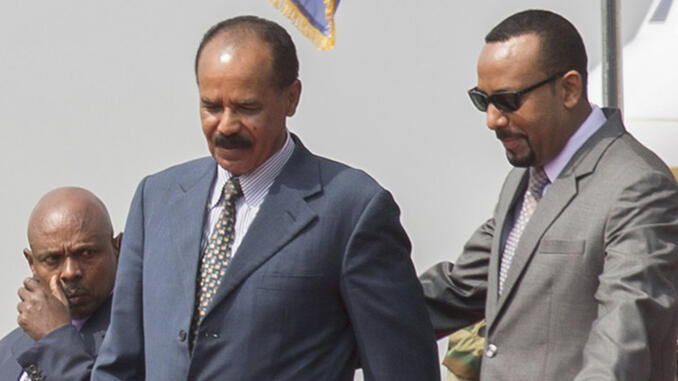
One of the more positive events to have happened in 2018 is the signing of a peace deal between Ethiopia and Eritrea. The two countries fought a two-year long war that ended in 2000 and left an estimated 80,000 dead. Since then a cold war has existed between the two countries that has occasionally turned hot. In 2012 Ethiopia bombed several militaria camps in Eritrea used by the Ethiopian opposition. In 2015 the country bombed Eritrean mines and weapons depots. And in 2016 the two sides came to more blows. So it came as a surprise when In July the new Ethiopian Prime Minister Abiya Ahmed made the announcement that he would accept a peace deal with Eritrea.
On July 8, Abiya Ahmed was in the Eritrean capital, Asmara, embracing his erstwhile foe, the aging dictator, Issaias Afwerki. During a televised event, Prime Minister Ahmed declared, “There is no border between Ethiopia and Eritrea. Instead we have built a bridge of love.” The signing of a joint declaration of peace allowed the two countries to open their respective embassies, restored phone calls between the two nations, and allowed families who have been separated for more than two decades to visit each other once again. Ethiopia will relinquish occupied lands it gained during the fighting and will gain access to Eritrean ports which are the closest in the region for the landlocked country.
Abiya Ahmed has become a star as the architect of the peace agreement. His two predecessors, Hailemariam Desalegn and Meles Zenawi had promised peace but never delivered. Upon the peace agreement the Ethiopian leader ended the nation’s state of emergency and released political prisoners. Issaias Afwerki, who has been Eritrea’s only leader since it declared independence from Ethiopia in 1993, loses a major justification for his authoritarianism and maintaining a large army. His regime has often been called the “North Korea of Africa” and some experts hope that the peace agreement will bring much needed governing change. Last month the United Nations Security Council lifted sanctions against the regime that have been in effect for nine years.
There is much work to be done to maintain peace which promises to boost the two economies. The surprise agreement, which was nobody thought possible just a few months before, was a good first step that has brought on some important changes. The two countries now have a great opportunity before them. Africa and the world hope they seize it.
